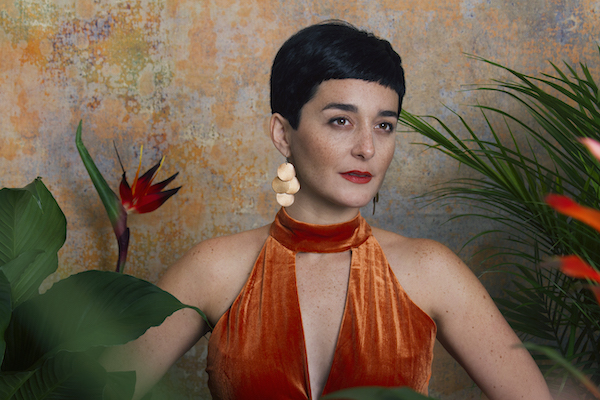Jan 13, 2026 2:09 PM
More Trump-Kennedy Center Cancellations
The fallout from the renaming of the John F. Kennedy Center for the Performing Arts to include President Donald…

Camila Meza is among the 25 artists DownBeat thinks will help shape jazz in the decades to come.
(Photo: Rachel Thalia Fisher)Singer and guitarist Camila Meza was slightly anxious when, as a 19-year-old jazz novice, she took the stage for her debut at Thelonious, a top club in her native Santiago, Chile. But as she worked her way through a set of standards, she grew calmer. By the end of the night, she had found a home.
“I was [thinking], ‘OK, this is it,’” she said in August, her searching eyes framed by the screen in a Zoom transmission from a lush site in Montana, where she had been holed up for five months because of the pandemic.
Meza, 35, seemed at home in Big Sky country—a setting that recalled the hills around Santiago, where she frolicked gamely in a video shot in February 2019 for “Kallfu,” the striking opening track on her breakthrough album, Ámbar (Sony Masterworks).
She reflected on the distance she had traveled, artistically and geographically, since that Thelonious gig. In 2007, she released Skylark, followed by two more collections of others’ tunes, Retrato (2009) and Prisma (2013).
Traces (2016), her first full-scale presentation of her own music, won two Independent Music Awards. But even as she was preparing to release that album, she was thinking about material for Ámbar, which, by involving a contemporary string quartet, transformed her sound.
“It is a record,” she explained, “that is ambitious in a way that, ‘Yes, I’m going to write my own songs and arrangements, but I’m also going to explore new orchestrations and new ways of expressing certain emotions and journeys within the music.’”
On “Kallfu,” she integrates primal vocals and nimble guitar work with a jazz trio and the string quartet, which, by turns, drives the rhythm in minimalist fashion and breaks the rhythm with aleatoric invention.
In Meza’s music, poignant explorations of sadness are offset by an occasional joyful noise. “Kallfu,” she said, was intended to do just that for Ámbar by introducing a “song that was in the brighter spectrum.”
In “Portal,” an extended composition she hopes to record, she expresses both sides of her musical personality. Employing fresh instrumentation—a harp, electronics and additional singers join her voice, guitar and piano-bass-drums trio—this highly textured work evokes both the near-apocalypse and ultimate salvation. Premiered in June 2019 as part of The Jazz Gallery’s commission series, its theme has special resonance these days.
“One of the very clear learnings of this time is to be able to let go of certain things, like attachments to whatever you think life should be,” she said. “We had a beautiful year last year and now, after a few months of not feeling creative—I was pushing myself through these emotional waves of feeling good and feeling bad—I’m starting to feel renewed energies to just speak for the moment.” DB
This story originally was published in the November 2020 issue of DownBeat. Subscribe here.

Belá Fleck during an interview with Fredrika Whitfield on CNN.
Jan 13, 2026 2:09 PM
The fallout from the renaming of the John F. Kennedy Center for the Performing Arts to include President Donald…

Peplowski first came to prominence in legacy swing bands, including the final iteration of the Benny Goodman Orchestra, before beginning a solo career in the late 1980s.
Feb 3, 2026 12:10 AM
Ken Peplowski, a clarinetist and tenor saxophonist who straddled the worlds of traditional and modern jazz, died Feb. 2…

The success of Oregon’s first album, 1971’s Music Of Another Present Era, allowed Towner to establish a solo career.
Jan 19, 2026 5:02 PM
Ralph Towner, a guitarist and composer who blended multiple genres, including jazz — and throughout them all remained…

Rico’s Anti-Microbial Instrument Swab
Jan 19, 2026 2:48 PM
With this year’s NAMM Show right around the corner, we can look forward to plenty of new and innovative instruments…

Richie Beirach was particularly renowned for his approach to chromatic harmony, which he used to improvise reharmonizations of originals and standards.
Jan 27, 2026 11:19 AM
Richie Beirach, a pianist and composer who channeled a knowledge of modern classical music into his jazz practice,…